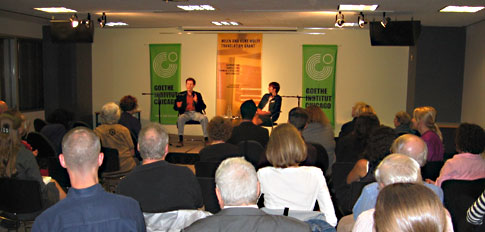www.derdiewas.de - Die Website zum Buch von David Bergmann
Navigation 1
Take me to your Umlauts! - page 2
All of these examples make it easy to accuse native English speakers of having a certain degree of umlaut-envy. After all, the English language does not have the cute letters Ä, Ö, and Ü. We didn't even have a name for them in English, so we had to steal the German name "umlaut." Otherwise, they would probably have to be called something like "the two cute alphabetical dots" or "little bird feet." However, at least during its adoption into English it has been given a different plural: "umlauts". (In German, the plural form is inexplicably "Umlaute".)
Of course, German is not the only language in the world in which these little "power dots" appear. You can also find umlauts in languages such as Finnish, Swedish, and Turkish. However, German is in fact the mother of all umlauts. Sometime during the Middle Ages in the German-speaking countries, scribes began writing the letter E over the letter U whenever the combination UE appeared in a manuscript. This was not only a handwriting shortcut, but also space-saving and somehow more elegant. Gradually, the E became smaller and smaller until it finally developed into two dots. Of course, this development was noted by other northern and central European countries and was adopted in many other languages.

At that time, the Arabic script was still used in the rapidly expanding Ottoman Empire. I believe the true reason why the Turks fought their way so fanatically to the gates of Vienna in the 17th century was that they were searching for the "Secrets of the Umlauts". But since they were repulsed by the Austrians, the written Turkish language was to remain "umlautless" for several additional centuries. The Latin script – along with umlauts - was not introduced to the Turks until shortly after World War I. (I suspect that in return for their military support of the German and Austrian empires in the Great War, the Turks demanded umlaut secrets. And they got them!)